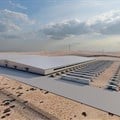
Namibia is taking pole position in the race to lead Africa's green energy economy.
Africa's green hydrogen economy will require substantial investment, with estimates ranging from $450bn to $900bn by 2050.
This translates to an annual investment of around $6bn until 2030, with over $200m per year needed for infrastructure alone to achieve net-zero goals.
The current market leaders in the region have made massive commitments.
Mauritania has planned four large-scale projects worth $100bn, while the Ramaphosa administration is spending the bulk of South Africa’s just energy transition war chest on a pipeline of projects valued at $17.8bn.
Summit host Namibia is set to begin production on a $9.4bn project in 2026.
Euros driving the market
The European Investment Bank projects that Africa could produce over 50Mt of green hydrogen annually by 2035, at a cost competitive with global oil prices.
However, the current production cost of green hydrogen, between €2.5/kg and €5.5/kg, remains higher than fossil fuel alternatives.
"Namibia, with its rapid project development, is at the forefront. South Africa, Morocco, Egypt, Kenya, and Mauritania are also making significant strides,” says Marques.
“Then we also see exciting plans and developments coming up in countries like Djibouti, Angola, Ethiopia, and Nigeria.
“Finally and given the proximity to Europe and global markets, there is huge potential in Algeria, Tunisia and Libya.”
Challenges and opportunities
The energy transition clock is ticking for Africa, though.
New processes are being trialled to replace platinum in the green hydrogen value chain – which is an existential threat to the crisis stricken PGM market that forms the backbone of Cyril’s hydrogen valley dreams.
However, Marques remains optimistic; "The summit will provide the perfect platform to discuss and formulate innovative approaches to overcome these challenges and seize the vast opportunities."
“Assessing the inherent and/or perceived risks its crucial for investors looking to fund green energy projects,” he explains.
“The investors will firstly look at the enabling environment and framework, what are the conditions on the ground? What are the legal and fiscal frameworks and incentives? These are some of the questions investors will want robust clarity on.”
Investor considerations
Environmental and social impact assessments (ESIAs) are also crucial in ensuring projects adhere to international standards and benefit local communities.
“Given the advantage of abundant wind and solar resources, African countries can be highly competitive in supplying clean hydrogen for local and global consumption, but the project development and implementation needs to follow strict procedures in which the ESIA are a major component,” explains Marques.
The Global African Hydrogen Summit's Project Investment Roundtables involve a rigorous review process by an Investor Board comprising representatives from various financial institutions.
Projects are evaluated and matched with investors based on their specific needs and interests.
"The ultimate aim is to drive critical investments and financing into bankable clean energy projects throughout Africa," Marques concludes.






















































